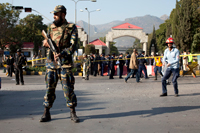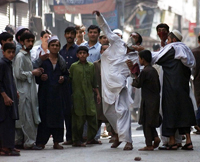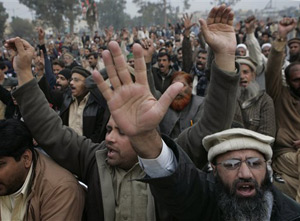On the Issues: Pakistan Year in Review
Pakistan expert Moeed Yusuf answers questions about the latest suicide bombing in Pakistan and looks back on Pakistan in 2010.
 A suicide bomber carried out a Christmas Day attack in northwest Pakistan, killing 46. Also this week, Pakistan remembers the loss of one of its most popular leaders who was tragically assassinated on Dec 27, 2007. The inquiry into the assassination of Benazir Bhutto is still ongoing.
A suicide bomber carried out a Christmas Day attack in northwest Pakistan, killing 46. Also this week, Pakistan remembers the loss of one of its most popular leaders who was tragically assassinated on Dec 27, 2007. The inquiry into the assassination of Benazir Bhutto is still ongoing.
Our USIP analyst, Moeed Yusuf, looks at events today in Pakistan. USIP is working hard in Pakistan. Last year we set the stage for expanded people-to-people contacts, sponsoring a series of discussions of current issues among a range of Pakistanis. Next year we expect to emphasize religious tolerance in these discussions and add our voice to counter extremist rhetoric in that critical country.
- How would you assess the impact of the weekend suicide bombing in Pakistan?
- As you look back on 2010, how has Pakistan fared this year, politically? What are the challenges ahead?
- Going Forward: USIP Goals in Pakistan

How would you assess the impact of the weekend suicide bombing in Pakistan?
The suicide attack was a stark reminder that the situation in Pakistan's so-called 'cleared' areas is far from satisfactory and that the military continues to have its work cut out in these regions, let alone considering opening new fronts. Bajaur agency in FATA (Federally Administered Tribal Areas), where this attack took place, was cleared more than once and 'victory' was declared by the Army High Command.
However, as is clear from this episode, the militants retain the capacity of launching coordinated attacks from time to time from their relatively secure mountain hideouts across the tribal belt. Even elsewhere - most notably South Waziristan - militancy is raising its head again. To be sure, the military will have to continue operating in these regions to prevent the militants from threatening the state's writ as they did before. Normalcy will likely remain a far cry for the foreseeable future.

As you look back on 2010, how has Pakistan fared this year, politically? What are the challenges ahead?
The PPP (Pakistan People's Party) government has made significant political achievements during its tenure but they have been overshadowed by a rather dismal governance performance and a compromised law and order situation.
In 2010, the government held on to a tenuous coalition of partners despite intermittent shocks, persistent rumors of certain opposition actors seeking a midterm change, and a typically delicate civil-military equation. The government also managed to pass the historic 18th amendment to the constitution which removed various anomalies to the country's 1973 constitution that were introduced during military rule. This is being followed by a 19th amendment that will address remaining concerns, including those raised by the judiciary. These amendments make for a stronger federation.
Unfortunately, the government's political achievements have not been matched by its performance in other areas. Civil society actors have criticized the government for alleged corruption and mis-governance - PPP's failure on the governance front is even privately acknowledged by many of its own members.
Looking ahead, the government seems set to complete its five year tenure, itself a rarity in Pakistan, but barring a turnaround in its performance on non-political fronts, it will be not managed without periodic upheavals and crises. Islamabad promises to remain an exciting place until the next national election in 2013.

Going Forward: USIP Goals in Pakistan



